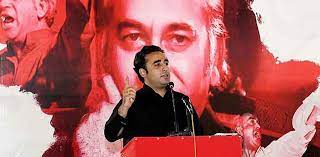PPP terms July 5 darkest day in country’s history

Islamabad: Pakistan People’s Party Parliamentarians co-chairman Asif Ali Zardari and Chairman Bilawal Bhutto have termed July 5 the darkest day in the country’s political history.
They said that on this day, a power-hungry group took away the Constitution from the nation. In a statement marking July 5, when a democratic government was overthrown by General Ziaul Haq’s imposition of Martial Law in 1977, Zardari said that undemocratic forces had trampled upon the freedom, sovereignty, and independence of the country on that fateful day.
He said that Quaid-i-Awam Zulfikar Ali Bhutto had built a dignified and nuclear Pakistan. He said: “Under the leadership of the Quaid-i-Awam, Pakistan was rapidly achieving development goals. However, on July 5, 1977, Pakistan was plunged into darkness.”

Zardari said that Pakistan continues to suffer from the consequences of the unconstitutional actions taken on July 5, 1977. He lamented the societal destruction caused by fostering linguistic and communal prejudices throughout the country. He highlighted the situation in Waziristan, once a paradise on earth, which fell victim to extremist ideologies.
Zardari reaffirmed the PPP’s unwavering commitment to making Pakistan a free, independent, and dignified nation once again. He paid tribute to those who sacrificed their lives in the struggle for the restoration of the 1973 Constitution and democracy, honouring their endurance of executions, floggings, imprisonment, and torture. He said that the PPP adheres to the philosophy of Shaheed Zulfikar Ali Bhutto, which represents a beacon of hope for a progressive, enlightened, prosperous, egalitarian, and pluralistic Pakistan. He said that the PPP leadership and workers will work together to build the envisioned free, independent, and dignified Pakistan, as envisioned by Shaheed Mohtarma Benazir Bhutto.
Separately, PPP Chairman Bilawal Bhutto referred to July 5, 1977, as a black day in the nation’s history and said that the day serves as a reminder of how a power-hungry dictator thrust the entire nation into the depths of extremism, terrorism, the proliferation of arms, and a drug culture under the guise of religion. Even after 46 years, the nation continues to struggle to rid itself of these afflictions.
Bilawal said that on July 5, 1977, General Ziaul Haq had unlawfully seized power, overthrowing the government of Shaheed Zulfikar Ali Bhutto, the first elected prime minister of Pakistan and the most popular leader, and deprived citizens of their basic rights. He said that Zia is responsible for undermining the Constitution of Pakistan and oppressing the Pakistani nation. He emphasised that the violations of civil and human rights during Zia’s dictatorship and the atrocities committed against those who demanded the restoration of democracy will forever be a source of shame for humanity. Bilawal acknowledged that a few individuals who continue to follow the thinking of Zia are still conspiring against the people’s right to govern, driven by their hunger for power. However, he declared that failure awaits them, as the era of dictators and puppets belongs to the past. He asserted that democracy is the present and future of Pakistan. The PPP chairman saluted party workers who endured floggings, imprisonment, and martyrdom during the Zia regime in their pursuit of democracy. He vowed that his party would continue the struggle with determination and courage to protect the unanimous Constitution of 1973, and uphold the parliamentary system of democracy.





